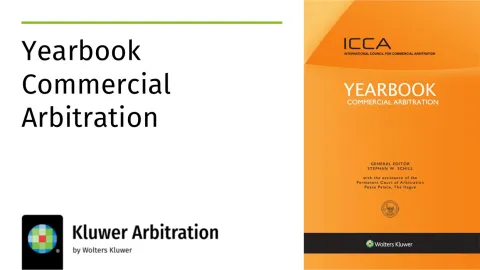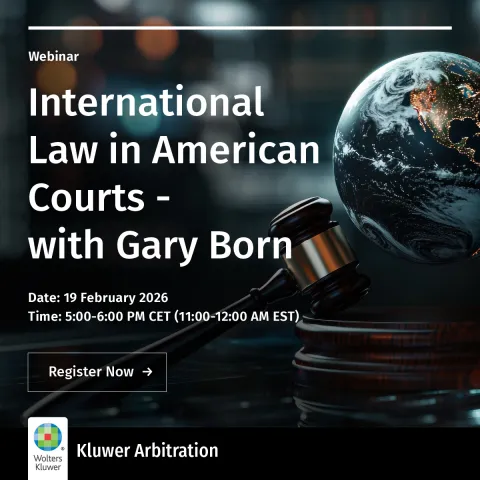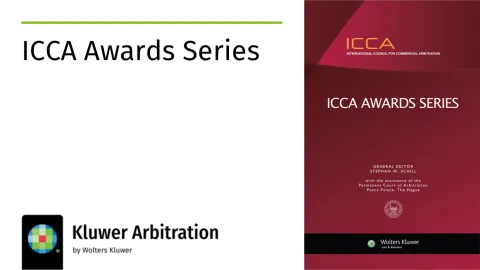CBAr 24th International Arbitration Conference: Day Three—Integrity and Arbitration
October 12, 2025
From September 17 to 19, 2025, the Brazilian Arbitration Committee ("CBAr") held its 24th International Arbitration Conference ("24th CBAr IAC" or "Conference") in Rio de Janeiro. Marking yet another milestone in the Committee’s history, this year’s edition gathered more than 700 participants from 14 countries and 46 speakers. The event reaffirmed CBAr’s standing as one of the leading arbitration forums in the world—a space where the dialogue between academia, practice, and institutions continues to thrive.
The third and final day of the Conference crowned what was, by every measure, a resounding success. After two intense days of discussion, the closing sessions turned to a timeless yet pressing topic: integrity. Integrity in the making, performance, and adjudication of contracts. Integrity in the conduct of parties and counsel. And, ultimately, integrity as the bedrock of arbitration’s legitimacy.
Integrity and Contract: The Architecture of Corruption
The morning panel, aptly titled “Integrity and Contract”, was moderated by Professor Anderson Schreiber (Schreiber Advogados), who opened the session by noting that, in many respects, arbitration itself is a test of contractual integrity. Contracts are the vessels through which trust is institutionalized—and arbitration is often where that trust is tested.
The first presentation, by Dr. Aloysius Llamzon (King & Spalding), offered a masterful comparative analysis of how corruption has been treated in international commercial arbitration. His lecture traced the evolution of arbitral practice from the 1960s to the present day. Dr. Llamzon recalled that from the 1960s to the 1990s, there was little consensus within the arbitration community on what an arbitrator or counsel should do when faced with indications of corruption. At that time, bribery was not only tolerated but, in some jurisdictions, even tax-deductible (see here).
Against that historical backdrop, today’s heightened awareness of corporate ethics represents an extraordinary legal and cultural transformation. The position taken in the seminal ICC Case No. 1110 decided by Judge Gunnar Lagergren, who famously declared that contracts tainted by corruption violate “international public policy” and are therefore unenforceable, no longer prevails. The current view is that arbitrators generally keep jurisdiction over claims involving contracts tainted by corruption, depending on their assessment of the arbitration agreement's validity.
In this context, Dr. Llamzon drew a critical distinction between contracts for corruption (whose very object is illegal, such as disguised consultancy agreements) and contracts tainted by corruption, in which the illicit conduct affects consent or performance. This difference, he emphasized, carries decisive legal consequences: the former are void ab initio, while the latter may be merely voidable.
The difference between void and voidable contracts may sound like a legal subtlety, but it has direct and practical effects. As explained here, if the contract is merely voidable, there are three possible outcomes:
“[F]irst, the main contract, obtained through corruption, is declared void; second, the injured party has the option between the invalidity of the agreement or its continuity; and third one, the main contract is deemed binding and effective, which limits the injured party’s rights to other remedies, such as damages or price reduction.”
In Brazilian arbitration practice, sometimes corruption is alleged strategically—not to invalidate the contract but to renegotiate its performance. As Professor Schreiber noted in his remarks, it is not uncommon for parties to raise corruption during the proceedings yet seek to uphold the very agreement they claim was tainted. Under Brazilian law, this tension finds an echo in the doctrine of simulation (simulação): with the 2002 Civil Code, the old rule in Article 104 of the 1916 Code—which prevented simulators from invoking the defect against each other—was superseded. Article 167 of the current Code now expressly recognizes simulation as a cause of nullity, meaning that a simulator may invoke it against the other party (Enunciado 294/CJF da IV Jornada de Direito Civil). (see here).
As Dr. Llamzon argued, tribunals should no longer treat corruption as a jurisdiction bar. The better view, supported by modern doctrine, is to address it as a matter of admissibility or merits, ensuring that arbitral justice confronts wrongdoing rather than evades it.
Republic of Nigeria v. P&ID: When Integrity Fails
Drawing from her experience representing sovereign states, the second speaker, Tafadzwa Pasipanodya (Foley Hoag), revisited the dramatic saga of Republic of Nigeria v. Process & Industrial Developments Limited (P&ID).
The case arose from a 2009 gas processing contract between the Nigerian government and P&ID, an Irish-registered company. When the project collapsed, P&ID initiated arbitration in London, obtaining in 2017 an $11 billion award—a sum so vast that it was material to Nigeria’s entire federal budget—on the basis that Nigeria had breached its obligations. Years later, evidence emerged that P&ID had bribed key Nigerian officials, obtained confidential documents improperly, and misled the arbitral tribunal throughout the proceedings.
Nigeria challenged the jurisdictional, liability, and final awards, alleging bribery, corruption, and perjury that tainted not only the contract but the arbitral process itself. In October 2023, the English High Court set aside the award under section 68 of the UK Arbitration Act, which allows a challenge for “serious irregularity affecting the tribunal, the proceedings, or the award.”
The court found that the arbitration had been fundamentally compromised by deceit and the misuse of privileged material. As the judgment observed, the awards were obtained only by "practising the most severe abuses of the arbitral process" (paragraph 516 of the Judgment). As explained here, three central issues established the causal link between the fraud and the award:
Firstly, P&ID's legal team had improperly obtained and retained privileged and confidential legal documents, which enabled P&ID and its lawyers (including an English solicitor and a King's Counsel) to track Nigeria's case strategy during the arbitration.
Secondly, P&ID presented and relied on evidence that it knew to be false.
Thirdly, P&ID bribed a Nigerian official throughout the arbitration to "buy her silence" about the fact that she had accepted their bribes at the time the underlying contract was made.
Pasipanodya used the case to deliver a compelling message about what she termed ethical infrastructure: integrity is not only a moral imperative but a matter of institutional governance. She urged counsel and institutions alike to establish internal protocols before crises occur.
She then turned to the tribunal’s role. The English court observed that the arbitrators had “nowhere near the truth,” partly because Nigeria’s participation was weak and fragmented. Could the arbitrators have done more? Should they have taken a more inquisitorial approach in light of the obvious red flags—skeletal contracts, implausible damages models, or repeated procedural defaults? Pasipanodya suggested that the duty of fairness sometimes demands courage. Arbitrators, she argued, must feel empowered to ask questions, request documents, when integrity itself is at stake.
In this regard, in 2024, the ICC issued the "Red Flags or Other Indicators of Corruption in International Arbitration" report, which provides for detailed guidance on the identification and assessment of corruption in arbitration proceedings, frequently called for by the arbitration and anti-corruption community, including arbitral tribunals, arbitration practitioners, and anti-corruption and compliance officers. Its purpose is to promote understanding of what red flags or other indicators are, their use, and their limits as a tool in establishing a corrupt practice.
In sum, Pasipanodya’s reflection is of particular relevance in jurisdictions like Brazil, where arbitrators often hesitate to intervene for fear of exceeding party autonomy. Yet the lesson of P&ID is clear: impartiality without integrity leads to injustice. True neutrality requires vigilance.
The Green Contract: ESG Obligations and the New Frontiers of Arbitrability
The panel’s final presentation, delivered in Portuguese by Professor Ana Filipa Morais Antunes (University of Coimbra), shifted the discussion from corruption to corporate sustainability. Her intervention—rigorous, eloquent, and steeped in European legislative developments—explored how companies’ social and environmental obligations are increasingly finding expression in contractual clauses and, consequently, in arbitration.
Building on the European Green Deal and the EU Corporate Sustainability Due Diligence Directive (CSDDD) adopted in June 2024, Professor Antunes explained that companies are now subject to legally binding duties of diligence, compliance, and risk management across their entire supply chains. This includes tracing the origin of raw materials, documenting strategic decisions, and assessing sustainability risks—what she aptly called the “know your business” obligation.
She emphasized that today’s contracts are subject to qualified scrutiny: parties must be able to justify not only the terms of their agreements but their purpose, alternatives considered, and documented rationale. In this context, contract design becomes a tool of mitigation. Well-drafted contracts, she argued, distribute risks clearly and reduce the likelihood that companies become entangled in ESG-related disputes or third-party harm.
Professor Antunes identified three major implications for practitioners:
invalid clauses: those that exempt liability for environmental damage, transfer responsibility to others, or dilute indemnification duties—will be unenforceable.
civil liability and partnership review will become common remedies, including justified termination of commercial relationships.
ESG arbitration is emerging as a new frontier (see here, here, and here): arbitrators will increasingly interpret clauses to determine what ESG obligations were actually undertaken and whether non-performance occurred.
Her most thought-provoking question was whether these disputes will require new rules or merely a reinterpretation of existing ones, a question that invites reflection. In addition, in her view, arbitration is particularly suited for ESG controversies due to the expertise of arbitrators, confidentiality, and procedural flexibility—especially in multi-party contexts.
Listening to her, I could not help but recall the debate at the 21st CBAr Conference, when we first asked whether arbitration could serve the ESG agenda (see here). Three years later, that question has evolved from speculation to regulatory inevitability. If corruption tests arbitration’s moral boundaries, ESG disputes will test its structural adaptability.
Arbitration Under Scrutiny: Resilience Through Integrity
After the morning’s dense discussions, the Conference concluded with a special panel moderated by Valeria Galíndez (GalindezArb) and featuring Alexander Fessas (Secretary General of the ICC) and Minister Ellen Gracie Northfleet (former Justice of the Brazilian Supreme Court). The title—Is Arbitration Under Attack?—could not have been more timely.
Ms. Galíndez began by observing that, although arbitration has grown rapidly in Brazil—including in contracts with the state and state-owned entities—it faces increasing scrutiny worldwide. Arbitrations now involve more sophisticated parties and complex disputes, increasing the demand for efficient resolution mechanisms.
Mr. Fessas provided an institutional response: criticism, he argued, is not a sign of decline but of relevance. “Arbitration is under scrutiny because it matters.” He referred to ongoing discussions within UNCITRAL concerning a potential Multilateral Investment Court, which could absorb existing bilateral frameworks while preserving enforcement of prior awards. He also cited the ICC’s own data: out of thousands of cases filed with the ICC, only 34 challenges to arbitrators were filed in the past year—and merely seven succeeded.
For him, “attacks” against arbitration often disguise attacks on the rule of law itself. Institutions, he added, must respond with transparency, data, and continued commitment to due process.
Minister Ellen Gracie Northfleet offered a broader, distinctly Brazilian perspective. Investment arbitration, she noted, historically faced legitimacy crises due to unequal bargaining power between investors and developing states. Although Brazil remains outside that system, it faces its own challenges—including isolated attempts to question the arbitral framework in high-profile domestic cases. Yet, she emphasized, the overall trajectory is solid, supported by consistent jurisprudence and an increasingly mature culture of enforcement.
Regarding concerns about delay and cost, the Minister pointed out that digitalization has drastically improved efficiency, while electronic proceedings have reduced expenses and procedural bottlenecks.
The Last Word: Integrity Renewed
The final day of the 24th CBAr IAC encapsulated the essence of this year’s Conference—a blend of intellectual rigor, ethical awareness, and human connection. From Dr. Llamzon’s historical excavation of corruption doctrines to Pasipanodya’s cautionary tale of P&ID, from Professor Antunes’s vision of ESG clauses as instruments of preventive justice to the closing dialogue on arbitration’s legitimacy, one theme prevailed: integrity is not the enemy of arbitration—it is its lifeblood.
As the sunlight continued to bathe Rio—a contrast to the rainy 21st edition—participants left the conference venue with renewed conviction that arbitration’s future depends less on innovation than on character. Integrity, after all, is not a constraint on autonomy but its highest expression.
Follow along and see all of Kluwer Arbitration Blog's coverage of CBAr 24th International Arbitration Conference here.
You may also like










